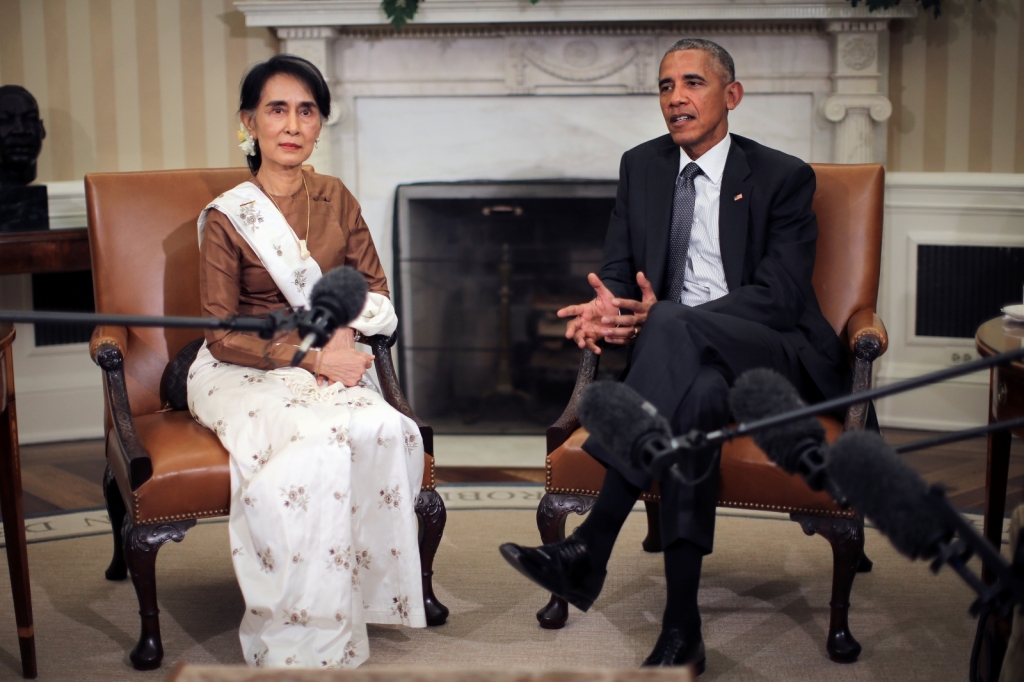-
Tips for becoming a good boxer - November 6, 2020
-
7 expert tips for making your hens night a memorable one - November 6, 2020
-
5 reasons to host your Christmas party on a cruise boat - November 6, 2020
-
What to do when you’re charged with a crime - November 6, 2020
-
Should you get one or multiple dogs? Here’s all you need to know - November 3, 2020
-
A Guide: How to Build Your Very Own Magic Mirror - February 14, 2019
-
Our Top Inspirational Baseball Stars - November 24, 2018
-
Five Tech Tools That Will Help You Turn Your Blog into a Business - November 24, 2018
-
How to Indulge on Vacation without Expanding Your Waist - November 9, 2018
-
5 Strategies for Businesses to Appeal to Today’s Increasingly Mobile-Crazed Customers - November 9, 2018
US lifting of economic sanctions on Myanmar
Obama announced the lifting of sanctions, which he said would take place “soon” and would help unleash Myanmar’s “enormous potential”, during a meeting with Aung San Suu Kyi on Wednesday at the White House.
Advertisement
Obama and Suu Kyi said in a joint statement Wednesday that the US will also give preferential trade status to Myanmar “in light of progress on a number of fronts, including strengthening protections for internationally recognized worker rights”.
“The United States is now prepared to lift sanctions that we have imposed on Burma for quite some time”, Obama was quoted by the Associated Press as saying.
The White House notified Congress on Wednesday it was offering preferential trade benefits to Myanmar that were suspended in 1989, a year after the bloody crackdown on democracy protesters by the military.
The US president’s deputy national security adviser Ben Rhodes has said the Obama administration is considering steps that can be taken to encourage US investment in Myanmar.
Suu Kyi’s visit to Washington signals her transformation from long-imprisoned heroine of Myanmar’s democracy struggle to a national leader focused on economic growth.
Suu Kyi has asked for all sanctions against the country to be lifted. Her official title is “state counselor”, but an audience in the Oval Office with Obama leaves little doubt of her stature.
In public there will be lofty rhetoric about freedom, peace and transition.
Suu Kyi’s pronouncements will likely be enough to break U.S. congressional deadlock on sanctions legislation.
The veteran campaigner must tackle all those problems while keeping an eye on generals who may have second thoughts about reform.
While Obama and his administration were pleased at Suu Kyi’s elevation to the role after decades as an outspoken critic of the military junta, rights groups are concerned at the condition of ethnic minorities in the country.
Tens of thousands of stateless Rohingya have spent the past four years trapped in bleak displacement camps with limited access to health care and other basic services.
“I think this will give the United States, our businesses, our nonprofit institutions greater incentive to invest and participate in what we hope will be an increasingly democratic and prosperous partner for us in the region”, said President Obama.
But as she began her first trip to the USA as Myanmar’s leader yesterday, Ms Suu Kyi would be held accountable for what her government has accomplished, and what it has not, since she took office six months ago.
“She is in a dilemma”, he said.
While the latest lift was celebrated in the business world, rights groups cautioned Obama was forgoing crucial leverage over the military, which still holds a quarter of parliament seats and controls several powerful ministries. Relations have changed from a measure-to-measure approach (in which specific reforms were met with concessions from the US) to a multi-pronged strategy through which conditionality becomes more hard. “It sends a bad message to say you’re not going to reward a government unless they do something, and then reward them anyway”, John Sifton, the deputy Washington director of Human Rights Watch, told the Times.
But it could also weaken USA leverage and perhaps let the military off the hook.
“The sanctions are crucial for pressing the military to end rights abuses and transfer power to a fully civilian government”, John Sifton, the Asia advocacy director for Human Rights Watch, wrote in a September 2 statement.
Advertisement
For her part, Suu Kyi described the range of economic policies her government was pursuing aimed at developing the economy.





























